Ecotourism in Costa Rica: Assessing the Impact on Economy & Life
VerifiedAdded on 2023/06/03
|6
|1145
|200
Report
AI Summary
This report examines the impact of ecotourism on Costa Rica's development, economy, and quality of life. It addresses the research problem of lacking analysis of ecotourism's effect on the country's economy and the population's quality of life. The study uses a positivism research philosophy and a deductive research approach, employing both qualitative and quantitative analysis of secondary data collected from government websites, journals, and articles. The research objectives include explaining the different types of ecotourism impacts, exploring knowledge of ecotourism, and identifying issues faced by Costa Rica residents and how ecotourism addresses them. The data is analyzed using content analysis, coding, and SPSS to identify relationships between variables, with reliability and validity measured using Cronbach’s alpha test.
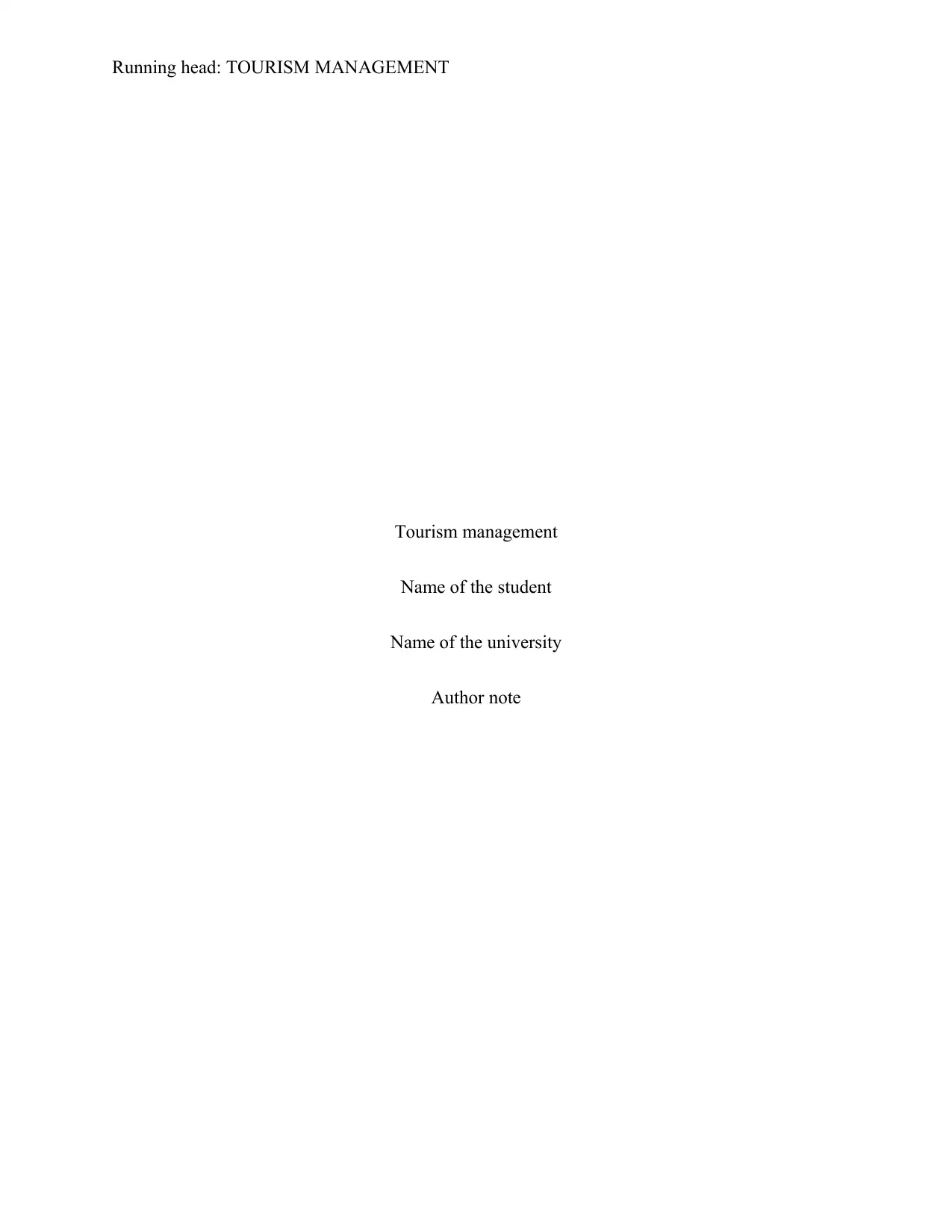
Running head: TOURISM MANAGEMENT
Tourism management
Name of the student
Name of the university
Author note
Tourism management
Name of the student
Name of the university
Author note
Paraphrase This Document
Need a fresh take? Get an instant paraphrase of this document with our AI Paraphraser
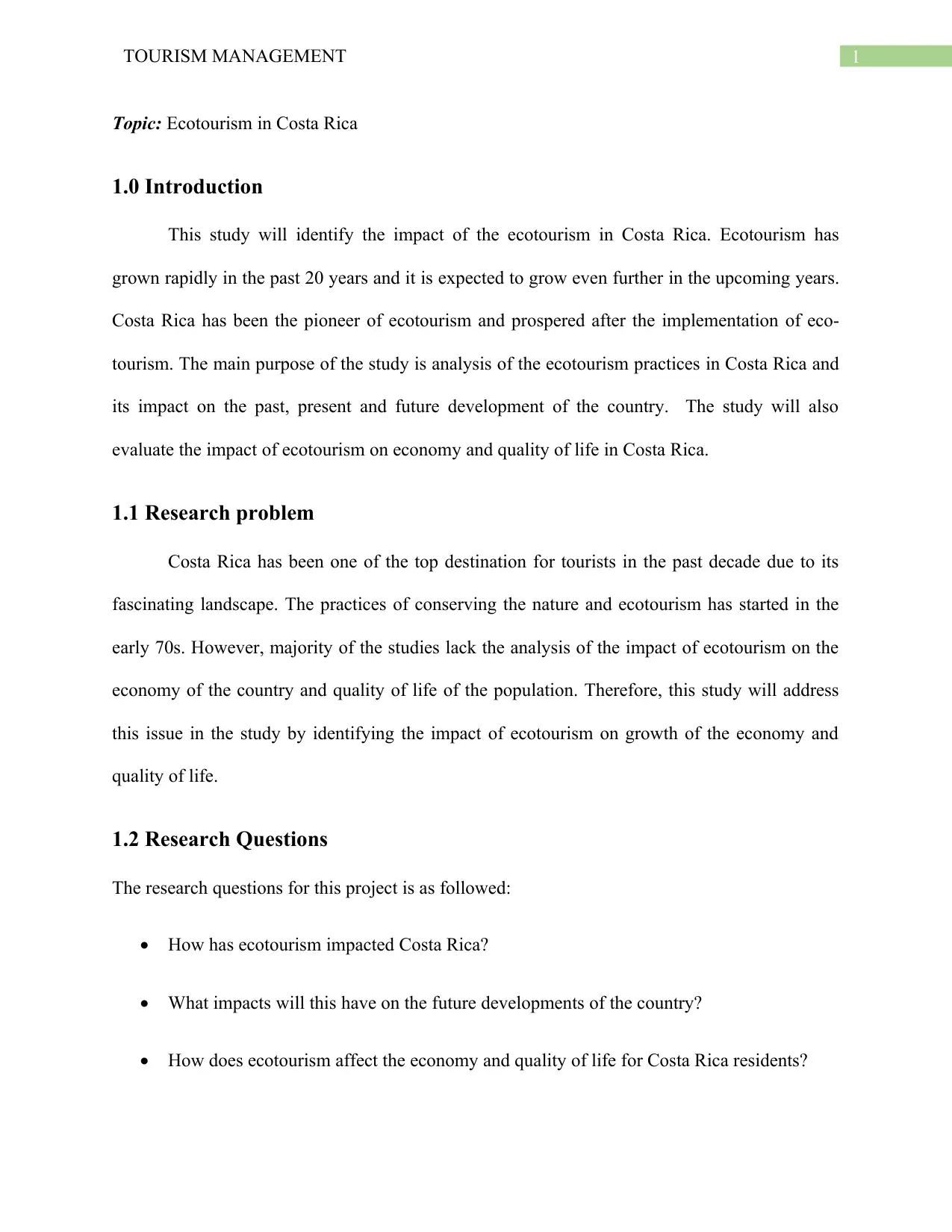
1TOURISM MANAGEMENT
Topic: Ecotourism in Costa Rica
1.0 Introduction
This study will identify the impact of the ecotourism in Costa Rica. Ecotourism has
grown rapidly in the past 20 years and it is expected to grow even further in the upcoming years.
Costa Rica has been the pioneer of ecotourism and prospered after the implementation of eco-
tourism. The main purpose of the study is analysis of the ecotourism practices in Costa Rica and
its impact on the past, present and future development of the country. The study will also
evaluate the impact of ecotourism on economy and quality of life in Costa Rica.
1.1 Research problem
Costa Rica has been one of the top destination for tourists in the past decade due to its
fascinating landscape. The practices of conserving the nature and ecotourism has started in the
early 70s. However, majority of the studies lack the analysis of the impact of ecotourism on the
economy of the country and quality of life of the population. Therefore, this study will address
this issue in the study by identifying the impact of ecotourism on growth of the economy and
quality of life.
1.2 Research Questions
The research questions for this project is as followed:
How has ecotourism impacted Costa Rica?
What impacts will this have on the future developments of the country?
How does ecotourism affect the economy and quality of life for Costa Rica residents?
Topic: Ecotourism in Costa Rica
1.0 Introduction
This study will identify the impact of the ecotourism in Costa Rica. Ecotourism has
grown rapidly in the past 20 years and it is expected to grow even further in the upcoming years.
Costa Rica has been the pioneer of ecotourism and prospered after the implementation of eco-
tourism. The main purpose of the study is analysis of the ecotourism practices in Costa Rica and
its impact on the past, present and future development of the country. The study will also
evaluate the impact of ecotourism on economy and quality of life in Costa Rica.
1.1 Research problem
Costa Rica has been one of the top destination for tourists in the past decade due to its
fascinating landscape. The practices of conserving the nature and ecotourism has started in the
early 70s. However, majority of the studies lack the analysis of the impact of ecotourism on the
economy of the country and quality of life of the population. Therefore, this study will address
this issue in the study by identifying the impact of ecotourism on growth of the economy and
quality of life.
1.2 Research Questions
The research questions for this project is as followed:
How has ecotourism impacted Costa Rica?
What impacts will this have on the future developments of the country?
How does ecotourism affect the economy and quality of life for Costa Rica residents?
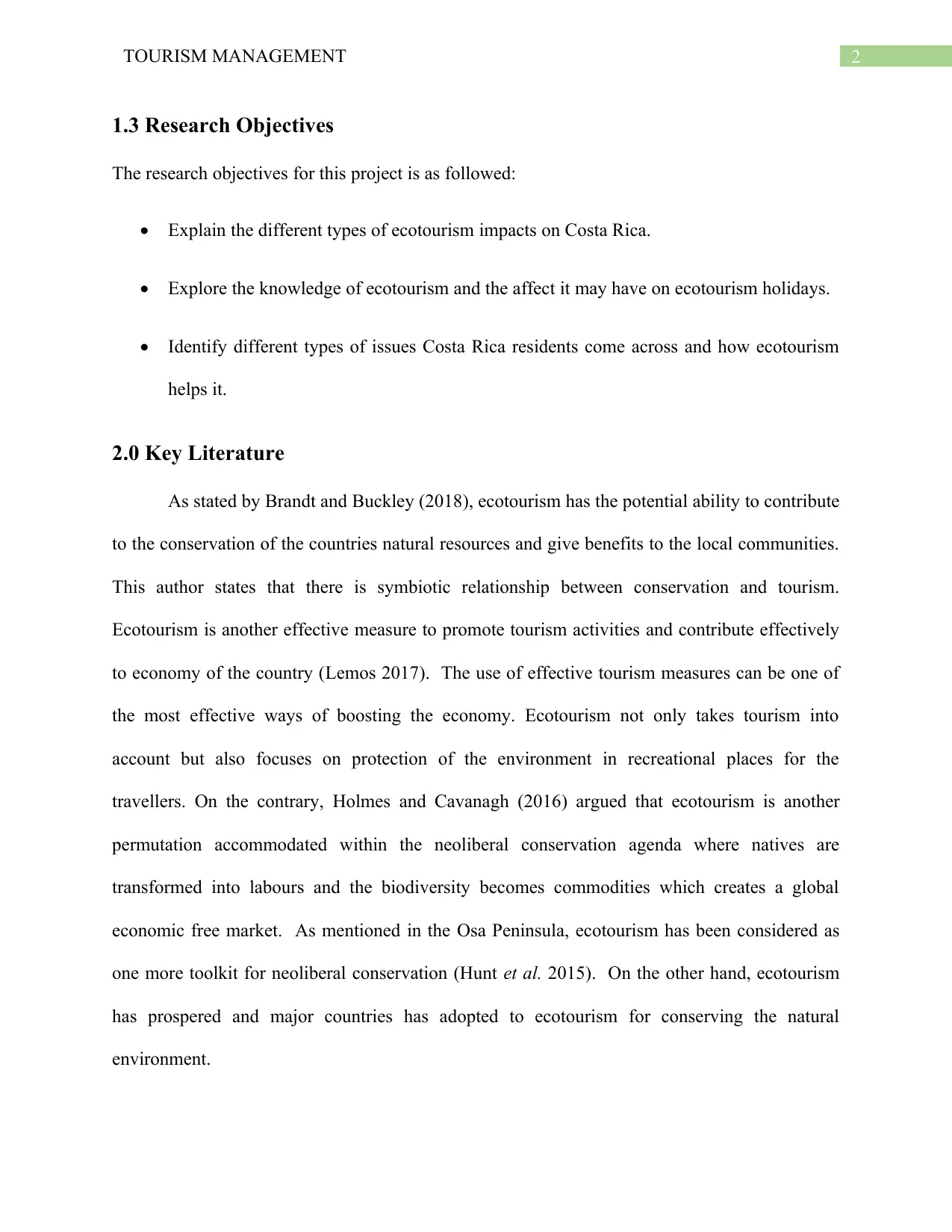
2TOURISM MANAGEMENT
1.3 Research Objectives
The research objectives for this project is as followed:
Explain the different types of ecotourism impacts on Costa Rica.
Explore the knowledge of ecotourism and the affect it may have on ecotourism holidays.
Identify different types of issues Costa Rica residents come across and how ecotourism
helps it.
2.0 Key Literature
As stated by Brandt and Buckley (2018), ecotourism has the potential ability to contribute
to the conservation of the countries natural resources and give benefits to the local communities.
This author states that there is symbiotic relationship between conservation and tourism.
Ecotourism is another effective measure to promote tourism activities and contribute effectively
to economy of the country (Lemos 2017). The use of effective tourism measures can be one of
the most effective ways of boosting the economy. Ecotourism not only takes tourism into
account but also focuses on protection of the environment in recreational places for the
travellers. On the contrary, Holmes and Cavanagh (2016) argued that ecotourism is another
permutation accommodated within the neoliberal conservation agenda where natives are
transformed into labours and the biodiversity becomes commodities which creates a global
economic free market. As mentioned in the Osa Peninsula, ecotourism has been considered as
one more toolkit for neoliberal conservation (Hunt et al. 2015). On the other hand, ecotourism
has prospered and major countries has adopted to ecotourism for conserving the natural
environment.
1.3 Research Objectives
The research objectives for this project is as followed:
Explain the different types of ecotourism impacts on Costa Rica.
Explore the knowledge of ecotourism and the affect it may have on ecotourism holidays.
Identify different types of issues Costa Rica residents come across and how ecotourism
helps it.
2.0 Key Literature
As stated by Brandt and Buckley (2018), ecotourism has the potential ability to contribute
to the conservation of the countries natural resources and give benefits to the local communities.
This author states that there is symbiotic relationship between conservation and tourism.
Ecotourism is another effective measure to promote tourism activities and contribute effectively
to economy of the country (Lemos 2017). The use of effective tourism measures can be one of
the most effective ways of boosting the economy. Ecotourism not only takes tourism into
account but also focuses on protection of the environment in recreational places for the
travellers. On the contrary, Holmes and Cavanagh (2016) argued that ecotourism is another
permutation accommodated within the neoliberal conservation agenda where natives are
transformed into labours and the biodiversity becomes commodities which creates a global
economic free market. As mentioned in the Osa Peninsula, ecotourism has been considered as
one more toolkit for neoliberal conservation (Hunt et al. 2015). On the other hand, ecotourism
has prospered and major countries has adopted to ecotourism for conserving the natural
environment.
⊘ This is a preview!⊘
Do you want full access?
Subscribe today to unlock all pages.

Trusted by 1+ million students worldwide
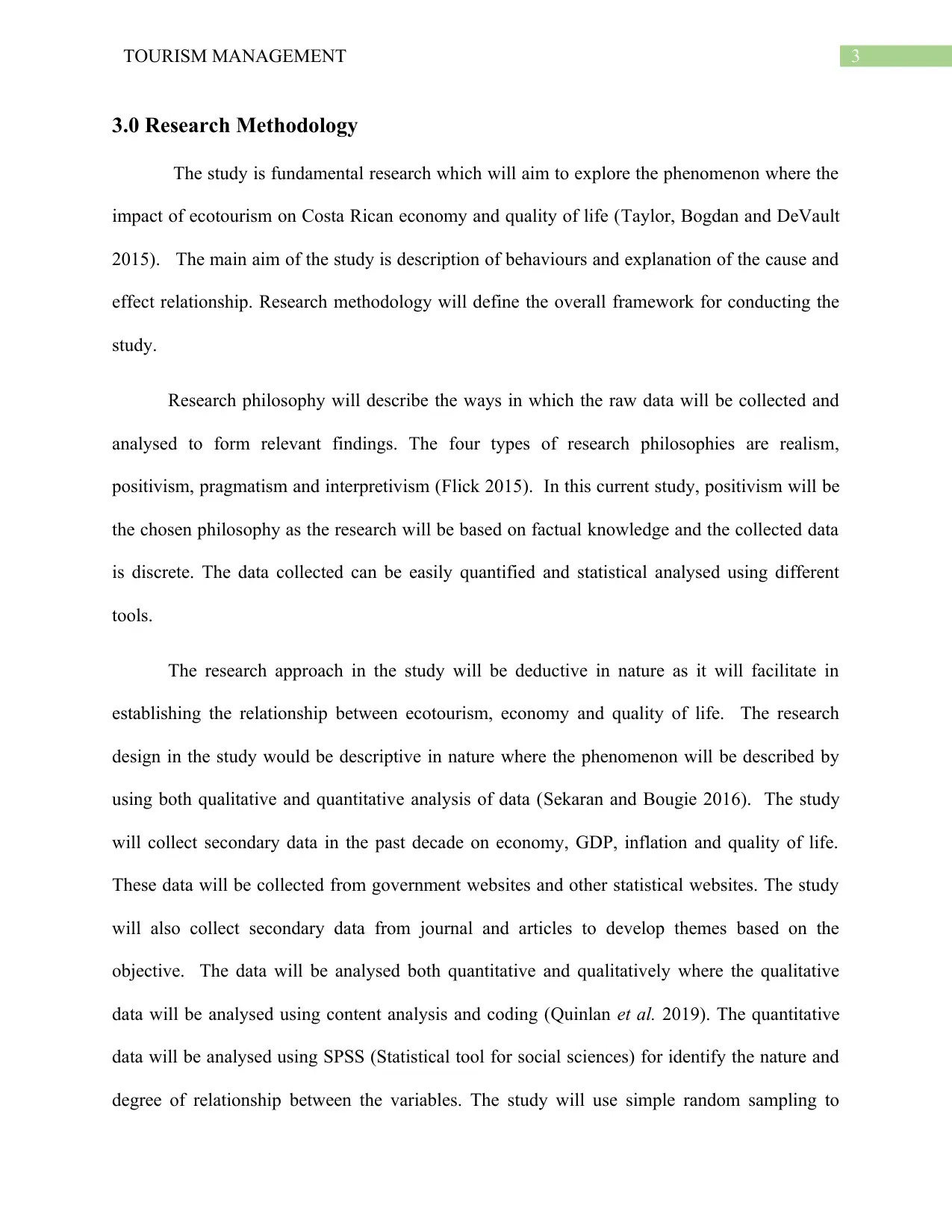
3TOURISM MANAGEMENT
3.0 Research Methodology
The study is fundamental research which will aim to explore the phenomenon where the
impact of ecotourism on Costa Rican economy and quality of life (Taylor, Bogdan and DeVault
2015). The main aim of the study is description of behaviours and explanation of the cause and
effect relationship. Research methodology will define the overall framework for conducting the
study.
Research philosophy will describe the ways in which the raw data will be collected and
analysed to form relevant findings. The four types of research philosophies are realism,
positivism, pragmatism and interpretivism (Flick 2015). In this current study, positivism will be
the chosen philosophy as the research will be based on factual knowledge and the collected data
is discrete. The data collected can be easily quantified and statistical analysed using different
tools.
The research approach in the study will be deductive in nature as it will facilitate in
establishing the relationship between ecotourism, economy and quality of life. The research
design in the study would be descriptive in nature where the phenomenon will be described by
using both qualitative and quantitative analysis of data (Sekaran and Bougie 2016). The study
will collect secondary data in the past decade on economy, GDP, inflation and quality of life.
These data will be collected from government websites and other statistical websites. The study
will also collect secondary data from journal and articles to develop themes based on the
objective. The data will be analysed both quantitative and qualitatively where the qualitative
data will be analysed using content analysis and coding (Quinlan et al. 2019). The quantitative
data will be analysed using SPSS (Statistical tool for social sciences) for identify the nature and
degree of relationship between the variables. The study will use simple random sampling to
3.0 Research Methodology
The study is fundamental research which will aim to explore the phenomenon where the
impact of ecotourism on Costa Rican economy and quality of life (Taylor, Bogdan and DeVault
2015). The main aim of the study is description of behaviours and explanation of the cause and
effect relationship. Research methodology will define the overall framework for conducting the
study.
Research philosophy will describe the ways in which the raw data will be collected and
analysed to form relevant findings. The four types of research philosophies are realism,
positivism, pragmatism and interpretivism (Flick 2015). In this current study, positivism will be
the chosen philosophy as the research will be based on factual knowledge and the collected data
is discrete. The data collected can be easily quantified and statistical analysed using different
tools.
The research approach in the study will be deductive in nature as it will facilitate in
establishing the relationship between ecotourism, economy and quality of life. The research
design in the study would be descriptive in nature where the phenomenon will be described by
using both qualitative and quantitative analysis of data (Sekaran and Bougie 2016). The study
will collect secondary data in the past decade on economy, GDP, inflation and quality of life.
These data will be collected from government websites and other statistical websites. The study
will also collect secondary data from journal and articles to develop themes based on the
objective. The data will be analysed both quantitative and qualitatively where the qualitative
data will be analysed using content analysis and coding (Quinlan et al. 2019). The quantitative
data will be analysed using SPSS (Statistical tool for social sciences) for identify the nature and
degree of relationship between the variables. The study will use simple random sampling to
Paraphrase This Document
Need a fresh take? Get an instant paraphrase of this document with our AI Paraphraser

4TOURISM MANAGEMENT
select sample data from the past decades to analyse the relationship. The reliability and validity
of the data will be measured using Cronbach’s alpha test.
select sample data from the past decades to analyse the relationship. The reliability and validity
of the data will be measured using Cronbach’s alpha test.
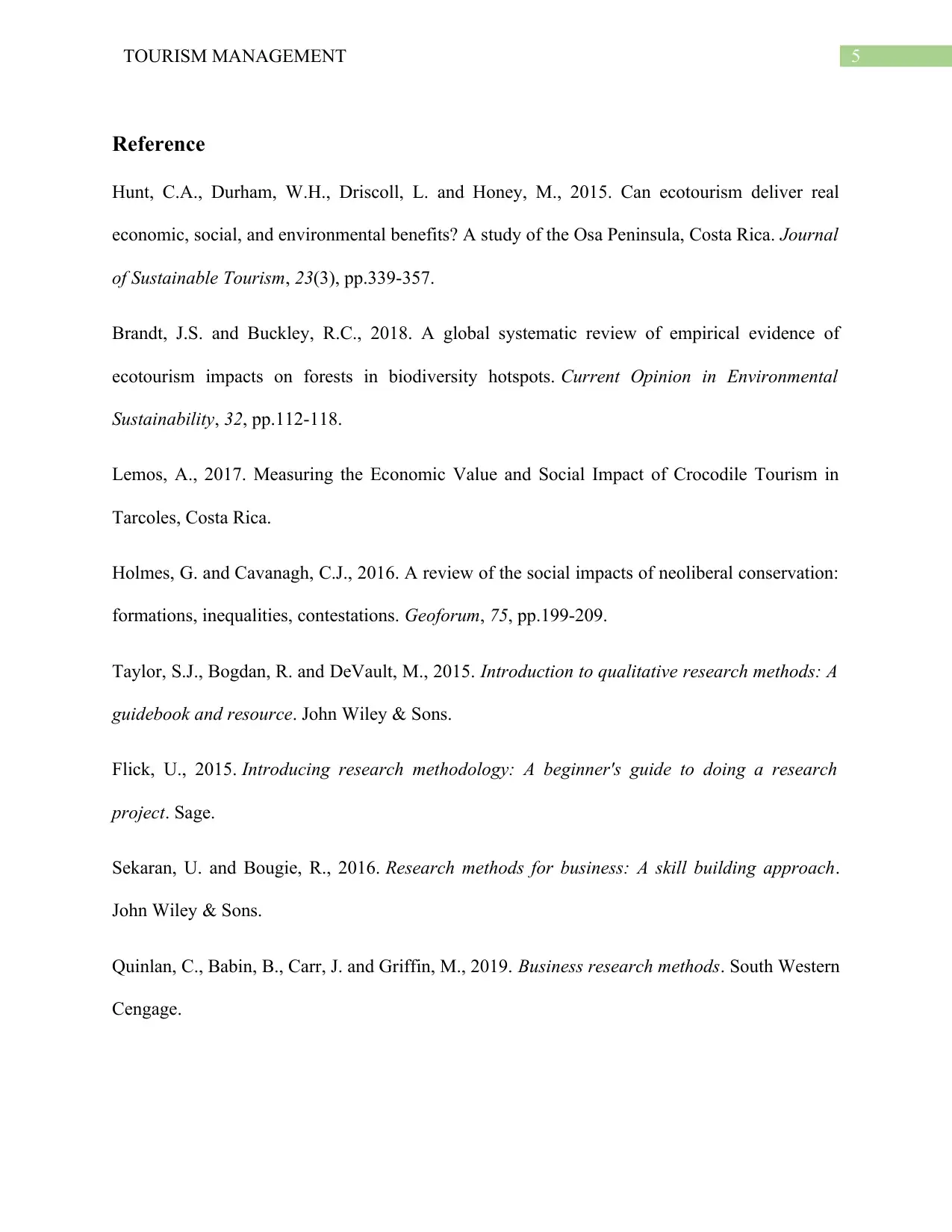
5TOURISM MANAGEMENT
Reference
Hunt, C.A., Durham, W.H., Driscoll, L. and Honey, M., 2015. Can ecotourism deliver real
economic, social, and environmental benefits? A study of the Osa Peninsula, Costa Rica. Journal
of Sustainable Tourism, 23(3), pp.339-357.
Brandt, J.S. and Buckley, R.C., 2018. A global systematic review of empirical evidence of
ecotourism impacts on forests in biodiversity hotspots. Current Opinion in Environmental
Sustainability, 32, pp.112-118.
Lemos, A., 2017. Measuring the Economic Value and Social Impact of Crocodile Tourism in
Tarcoles, Costa Rica.
Holmes, G. and Cavanagh, C.J., 2016. A review of the social impacts of neoliberal conservation:
formations, inequalities, contestations. Geoforum, 75, pp.199-209.
Taylor, S.J., Bogdan, R. and DeVault, M., 2015. Introduction to qualitative research methods: A
guidebook and resource. John Wiley & Sons.
Flick, U., 2015. Introducing research methodology: A beginner's guide to doing a research
project. Sage.
Sekaran, U. and Bougie, R., 2016. Research methods for business: A skill building approach.
John Wiley & Sons.
Quinlan, C., Babin, B., Carr, J. and Griffin, M., 2019. Business research methods. South Western
Cengage.
Reference
Hunt, C.A., Durham, W.H., Driscoll, L. and Honey, M., 2015. Can ecotourism deliver real
economic, social, and environmental benefits? A study of the Osa Peninsula, Costa Rica. Journal
of Sustainable Tourism, 23(3), pp.339-357.
Brandt, J.S. and Buckley, R.C., 2018. A global systematic review of empirical evidence of
ecotourism impacts on forests in biodiversity hotspots. Current Opinion in Environmental
Sustainability, 32, pp.112-118.
Lemos, A., 2017. Measuring the Economic Value and Social Impact of Crocodile Tourism in
Tarcoles, Costa Rica.
Holmes, G. and Cavanagh, C.J., 2016. A review of the social impacts of neoliberal conservation:
formations, inequalities, contestations. Geoforum, 75, pp.199-209.
Taylor, S.J., Bogdan, R. and DeVault, M., 2015. Introduction to qualitative research methods: A
guidebook and resource. John Wiley & Sons.
Flick, U., 2015. Introducing research methodology: A beginner's guide to doing a research
project. Sage.
Sekaran, U. and Bougie, R., 2016. Research methods for business: A skill building approach.
John Wiley & Sons.
Quinlan, C., Babin, B., Carr, J. and Griffin, M., 2019. Business research methods. South Western
Cengage.
⊘ This is a preview!⊘
Do you want full access?
Subscribe today to unlock all pages.

Trusted by 1+ million students worldwide
1 out of 6
Related Documents
Your All-in-One AI-Powered Toolkit for Academic Success.
+13062052269
info@desklib.com
Available 24*7 on WhatsApp / Email
![[object Object]](/_next/static/media/star-bottom.7253800d.svg)
Unlock your academic potential
Copyright © 2020–2026 A2Z Services. All Rights Reserved. Developed and managed by ZUCOL.



